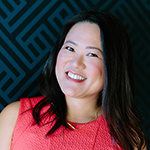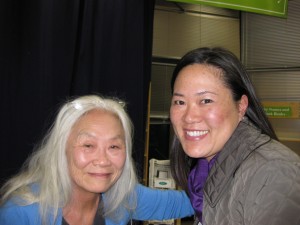Maxine Hong Kingston only writes one book each decade. So when she was at Kepler’s Books in Menlo Park, reading from her new poetry memoir “I Love a Broad Margin to My Life”, I made sure to be there.
Like many college students, I read Kingston’s “The Woman Warrior” in not one, but three different courses: Asian American Studies, Rhetoric, and in my senior year, in a non-fiction writing workshop taught by Kingston herself. I had marked the date on my calendar weeks ago,
but having my kids home for the President’s Week break from school, nearly forgot about it. While waiting for swim lessons, I read a magazine article in which the author mentioned a book signing. Suddenly, I remembered the event, texted my husband, and hurried home as soon as the kids were towelled off.
As expected, the bookstore was packed. From my vantage point way in the back, Maxine looked tiny. She always was. I remember first seeing her walk into the non-air conditioned fourth floor classroom that August, barely five feet tall and wearing a turquoise sundress. On this February night in 2011, Kingston was reading about a rural Chinese village, a rape, a lover, a woman and a baby, a well. Familiar topics from her first book revisited in her latest work.
Clearly comfortable in front of a crowd, Kingston’s voice was amplified by the bookstore’s audio system. The familiar cadence women – peace – shame – pride as seventeen years ago. Not skimpy on the presentation, Kingston went on to talk about being arrested in a peace protest in front of White House, about her own parents, and about aging itself. Not only in the I feel bad about my neck way, but in analyzing the differences between the American and Chinese perspectives on old age and death.
I bought her latest book, as well as a used paperback “The Woman Warrior” of the same 1989 printing as the copy that I’d read as a student. I queued up with the others to get them signed, then suddenly was gripped with questions: What am I going to say to her when I get up there? What magic is it that I’m looking for?
The man in front of me was trying to convince his teenage daughter to talk to Maxine, but the girl was too shy. When they reached the table, he explained to the author that his mother was about her age, and that their family had come from the same Toyshan region of China as Kingston’s parents.
Then it was my turn. “Hi, I’m Grace. I was in your class at Berkeley in 1992.”
“Oh, really!” Maxine exclaims, with genuine delight. “One of the big ones?”
“No, actually it was a writing workshop, in that room about the size of this table in Wheeler Hall.”
“Oh yes, I remember that room. Is this book from then?” she asked, opening the old paperback.
“No,” I admitted, “I lost that copy.”
“How?” she asked.
Maxine has a way of drawing out other people, and all of a sudden I feel compelled to blurt out a long-winded story about losing all of my books from college. About how I stored them in a box at my mother’s house and moved out of state. Several years later, when I tried to collect it, the box was gone.
She nods, as if she understands. Then she says something that I’ve never heard at a book signing, “And how is your writing?”
I give her the rundown, and she smiles.
“I’ll keep an eye out for you.”


Nice Grace.